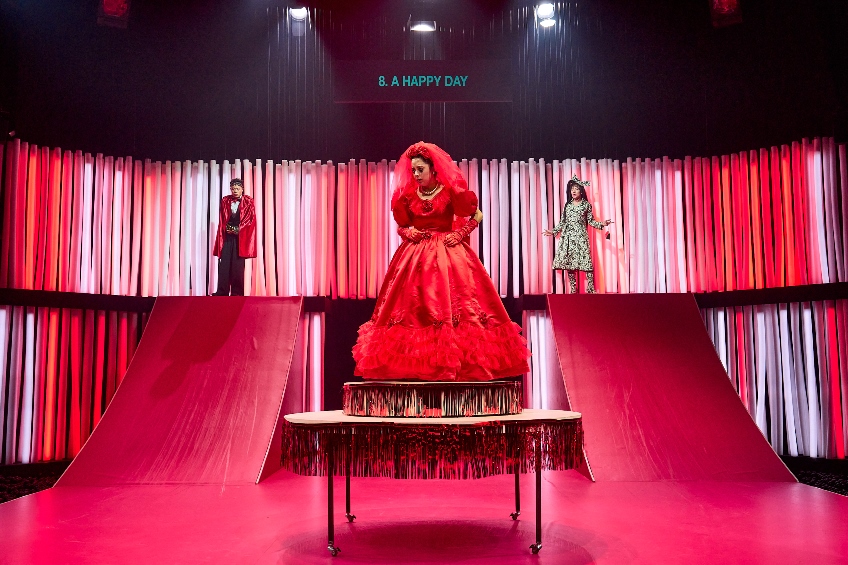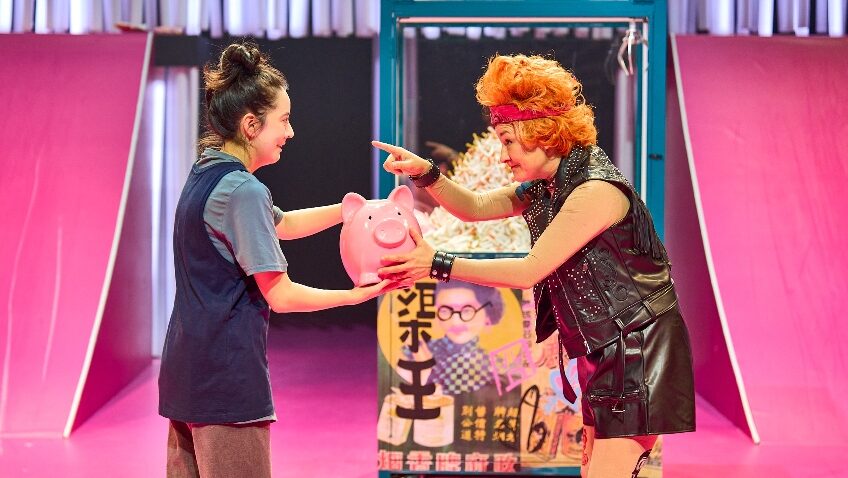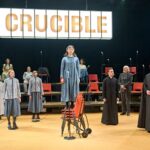A co-production of ETT, Sheffield Theatres and Lyric Hammersmith
Bright laughter and enjoyable, somewhat surreal spectacle run through Nina Segal’s bold reworking of Bertolt Brecht’s The Good Person of Szechwan as characters tussle with the sort of complicated dilemmas and frustrations that might belong to any of us. Language and attitudes are updated into a world of internet, mobiles and freely voiced swear words but storyline, characters and dilemmas remain broadly the same as the original.
Celebrating its 80th year now, the original play was written by Brecht when in exile from his native Germany. Like his other “parable” piece, The Caucasian Chalk Circle, it’s set in China and presents sudden, unexpected events that carry the characters along on a steamrolling roller-coaster of problems. As they battle with tough, impossible choices and decisions, Brecht has us think about the ethical and moral dilemmas, both personal and societal, that we all share. Nina Segal has us do this too, but more specifically while having a jolly good laugh.
Poor young woman Shen Te, who can never afford her rent, is forced to sell her body to keep afloat. But then, out of the blue come three gods – on a mission: they must find a human being who is good – just the one – to justify the continued existence of humanity. So far it’s been mission impossible, but when Shen Te puts them up for the night, albeit not totally willingly, they decide she’s “good” and give her a pile of cash. She buys a business, a tobacco shop, but instead of it bringing happiness and salvation, her problems now truly begin. She sets out being caring and generous but, like vultures, neighbours and strangers swoop in endlessly to take advantage of her kindness. As the money disappears should she become harder and colder and turn people in need away? But she’s not like that. Solution: slap on a false, curly moustache, stuff plastic balls down her pants and pretend she’s her own invented, bullying, cruel cousin, Shui Ta! He can see them off! Well, it seems a good idea at the time, but it leads,
of course, to all manner of complications and dark unpleasantness, especially when she falls in love with a young man who’s another vulture.
As events unfold, universal questions arise in the mind of the audience (potentially): in a society where money has all-important power and allure is it ever possible, or even sensible, for a good person to remain totally good? Does being good always come at a cost? Is a person still intrinsically good if they sometimes do bad things? What does good mean? Who decides? Are there ever definitive answers?
A strong cast of bizarre, brightly-clad characters come and go constantly to present the confusion of ups and downs of life, entertaining and delighting all the way and largely making swooping entrances at various angles via two very broad, bright pink slides set at either side of the Crucible stage. Along the top level sits a long fringe fence of dangling, plastic tubes, reminiscent of bamboo stalks or giant cigarettes, which fill with various permutations of bright light just like an arcade machine on which we may get lucky or unlucky. Around the stage’s perimeter a river of black and white plastic balls lie in channels; from these gods erupt in mortal form, props are buried, characters wade, or balls are borrowed for a female’s disguise as a male. Simple props come and go – the water seller’s paddling pool, flippers and bucket; a rice-cooker, a giant frog, a small one, an inflatable shark, a noose, and a glass-sided, arcade-style cigarette shop display into which people can climb; the oft-needed karaoke microphone is delivered by a black-clad theatre worker or by a waiter on a tray. As with Brecht, Segal’s version also has songs to further the thoughts in the piece, the words appearing above the stage as the music and lyrics pound out and characters sing and dance wholeheartedly.

As we well and truly suspend our disbelief, Ami Tredrea puts in a commanding performance as the good but far from perfect, Shen Te, transforming with an unrealistic tweek into her brutal, ruthless cousin/alter ego Shui Ta, who, at a later stage, becomes a pregnant Elvis in white flares and big hair! There’s hilarity, too, as she revolves in a beautiful red wedding gown, atop a white-clothed table, elaborate glitter balls whirling and a waiter lying on his back turning the turntable.
As Wang the water seller, full of secret, unrequited love for Shen Te, Leo Wan engages wonderfully, opening the play by directly addressing the audience in the prologue as Brecht does. Both funny and endearingly moving, he’s a more realistic being in many ways and perhaps more the good person the gods were seeking. Brecht had a penchant for inspiring cool, intellectual, rational thought in audiences but Wang tugs more at our emotional heartstrings, even as his brutally injured hand inspires comedy with its withering, coloured rubber glove.
Nick Blakely, Tim Samuels and Callum Coates portray the comic trinity of gods sent to live as mortals on earth, bringing delight each time they appear with their vibrant interactions, distinct personalities and fine comic timing. Initially in pristine white and looking like wise Greek philosophers with wheely suitcases and a book of rules on how to be good, they become more and more argumentative, indecisive, confused and typically human the more time they spend as mortals. Their outfits, too, become increasingly shabbier and grubbier and they lose the book of rules; by the end, they’re nothing but a mess of filthy tatters, desperate to affix their doll equivalents (one bespectacled) to a large arcade grabber and symbolically beam back up to the big God on high.
Strong multi-role performances come from all the cast, keeping stage and spectacle always busy and interesting. Aidan Chang is suitably cold, selfish, mercenary and unpleasant as Shen Te’s love interest, the would-be pilot Sun Yang. His mother (Louise May Newberry) dressed in bizarre, black and white, angular elegance is another who plagues and preys upon Shen Te along with capitalist landlady Mi Tzu, played by Melody Brown in golden boots and skirt with a see-through handbag, full of loads of money, while Suni La is great as a Scottish Mrs Shin. Entering as a giant rat, it’s Togo Igawa who delivers the epilogue, giving us more guidance than Brecht does as to what conclusions we might draw from this eventful, unlikely tale, suggesting that even if we can’t be good we can be better and even if we can’t avert the Apocalypse we must still try. Fair enough.
Directed by Anthony Lau, this production remains bright, energetic, playful and entertaining throughout in spite of the serious questions it poses about mankind’s propensity for greed, cruelty, aggression, exploitation, injustice and the trashing of the planet (etcetera, etcetera) while its characters certainly have enough of the more appealing aspects of humanity to endear them to us. Very pleasing indeed.
Eileen Caiger Gray
The show runs at The Crucible until April 1st, and at Hammersmith Lyric April 15th-May 13th. You can visit the Sheffield Theatres website by following this link and the Lyric Hammersmith website here.




